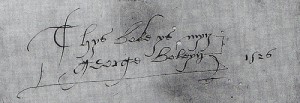
As today is the anniversary of the execution of George Boleyn, Lord Rochford, I wanted to remember in a positive way by remembering George the Poet. The following is an extract from Clare Cherry’s article “George Boleyn the Poet” – click here to read the full article.
From early on in his court career, George Boleyn was recognised as a talented court poet and musician. During his lifetime he received praise and respect for his accomplishments, and was considered by his contemporaries to be as talented as the renowned poets of the age, Thomas Wyatt and Henry Howard, Earl of Surrey. Unfortunately, we only know of George’s propensity for poetry from the writings and comments of various people living in the sixteenth century, many of whom knew George personally. The court chronicler Holinshed confirms of him, “He wrote divers songs and sonnets”1. George Cavendish, gentleman usher of Cardinal Wolsey and hardly a supporter of the Boleyn’s, praised his skill in verse as well as his good looks and natural gifts:
“God gave me grace, dame nature did her part,
Endowed me with gifts of natural qualities:
‘Dame eloquence also taught me the art,
In meter and verse to make pleasant ditties.”2
John Bale talks of his, “rythmos elegantissimos” and, according to Bale, George was the author of some of the most elegant poetry of the age.3
There is one particular poem that has been specifically assigned to George Boleyn entitled, “The Lover Complaineth the Unkindness of his Love”. In the manuscripts of John Harington, an author of literature in the sixteenth century, dated 1564, is a copy of this poem, which Harington attributes to George. Bale’s “Nugae Antiquae” utilises Harington’s manuscripts when assigning the piece to George, and likewise Horace Walpole, 4th Earl of Orford, used Harington when writing his “Catalogue of Royal and Noble Authors of England, Scotland and Ireland” published in 1806, which also attributes the piece to him. A letter written by Walpole states:
“I have had a piece of luck within these two days. I have long lamented our having no certain piece by Anne Boleyn’s brother, Lord Rochford. I have found a very pretty copy of verse by him in the new published volume of the Nugae Antiquae, though by mistake he is called Earl of, instead of Viscount, Rochford. They are taken from a MS. dated twenty-eight years after the author’s death, and are much in the manor of Lord Surrey’s and Sir T. Wyatt’s poems>”4
Tottel’s Miscellany assigns the poem to Thomas Wyatt, but as Harington was scrupulous in correctly attributing other compositions to the correct authors, it is entirely possible that the poem set out below is that of George Boleyn, although it is impossible to be certain:
The Lover Complaineth the Unkindness of His Love
My Lute awake, perform the last
Labour that thou and I shall waste,
And end that I have now begun!
And when this song is sung and rest,
My Lute be still, for I have done!The rocks do not so cruelly
Repulse the waves continually,
As she my suit and affection:
So that I am past remedy;
Whereby my lute and I have done.Proud of the spoil that thou hast got
Of simple hearts through Love’s shot,
By whom (unkind!) thou has them won,
Think not he hath his bow forgot,
Although my lute and I have done.Vengeance shall fall on thy distain
That mak’st but game on earnest pain:
Think not alone under the sun
Unquit to cause thy lover’s plain
Although my lute and I have done.May chance thee lie wither’d and old
In winter nights that are so cold,
Plaining in vain unto the moon:
Thy wishes then dare not be told,
Care then who list, for I have done.And then may chance thee to repent
The time that thou hast lost and spent,
To cause thy lovers sigh and swoon;
Then shalt thou know beauty but lent,
And wish and want, as I have done.Now cease my lute: this is the last
Labour that thou and I shall waste,
And ended is that we begun;
Now is this song both sung and past;
My lute be still, for I have done.5
Notes and Sources
- Holinshed, Chronicles, vol ii, p.1613
- Cavendish, Metrical Visions, p. 20
- Nugae Antiquae, vol ii, p.252
- Walpole, Letters, vol iv, p. 131
- This poem can be found in Walpole’s, Catalogue of Royal and Noble Authors of England, Scotland and Ireland, pp. 249-50 and Nugae Antiquae, vol ii, p. 400. Both Walpole and Bale extracted the poem from Harington’s original manuscript dated 1564.